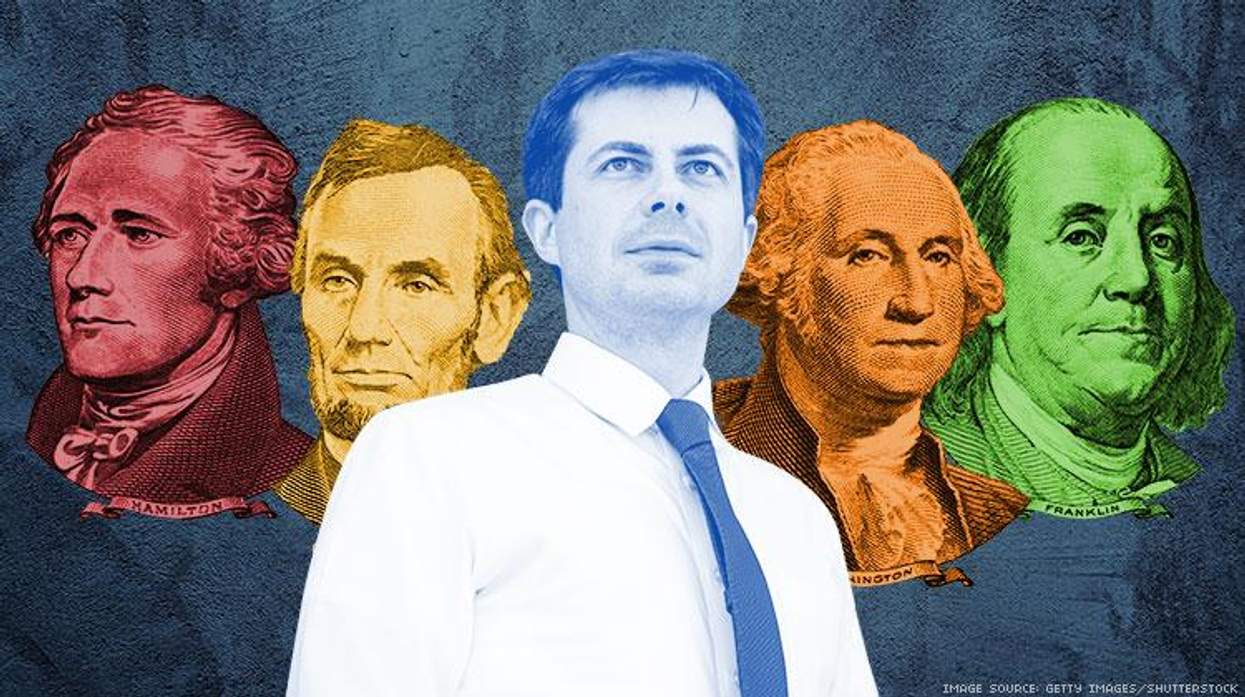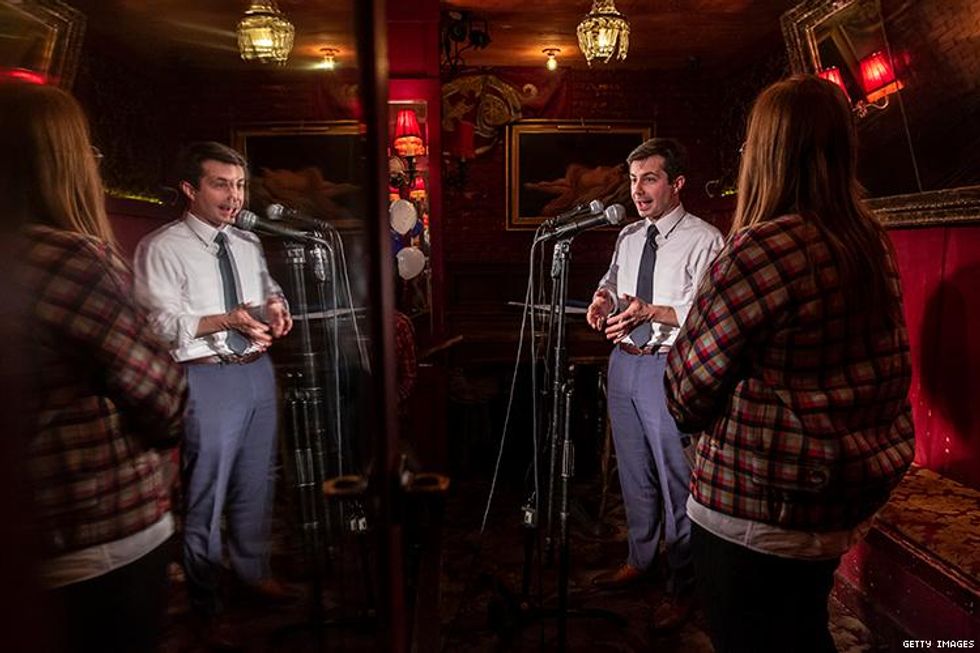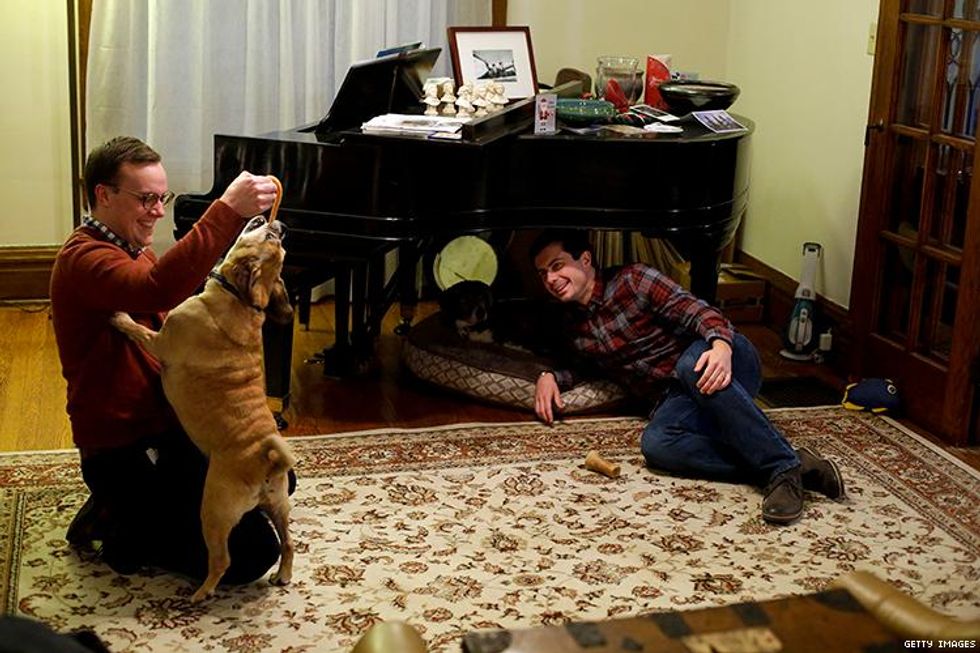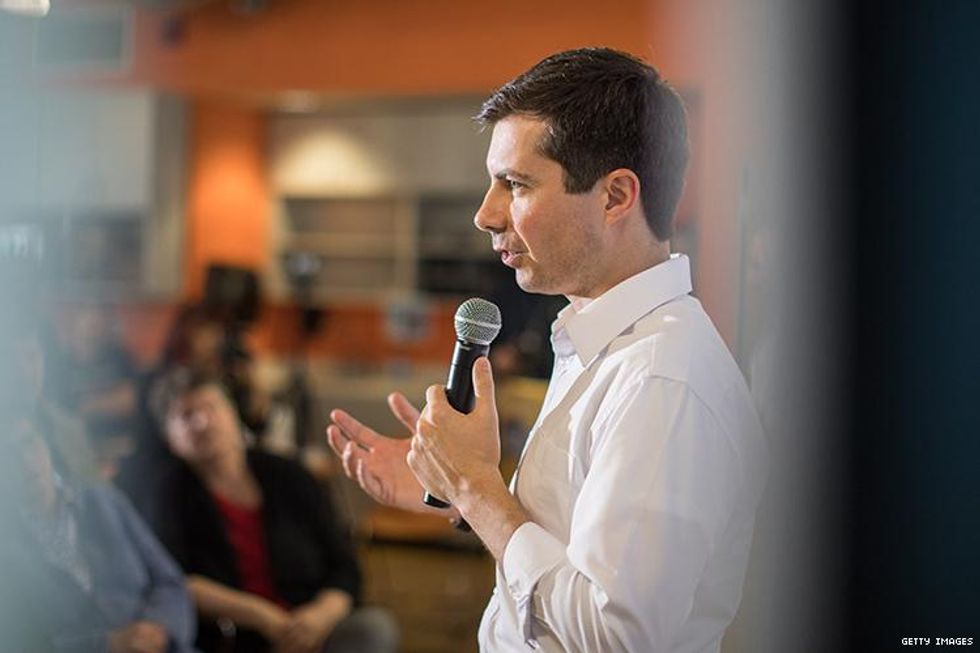This interview was conducted as part of The Advocate's interview series, LGBTQ&A, a weekly podcast that documents modern queer and trans history.
Here's a sentence I never thought I'd write: a gay man is running for president.
And if that isn't shocking enough, a recent poll has Pete Buttigieg ranked at #3, just behind Joe Biden and Bernie Sanders. There's still a ways to go before the first primary vote is cast. Polls will continue to change. But for Buttigieg, a person who was unknown to the majority of the country until just a few months ago, it's a remarkable accomplishment.
Pete Buttigieg has entered the national stage at exactly the right time. Buttigieg seems to have been created as the perfect antithesis to President Trump. He's a millennial, a veteran, and a Rhodes scholar who plays the piano and taught himself to speak Norweign. He's a polyglot and also speaks Spanish, Italian, Arabic, Maltese, Farsi, and French. He describes the global threats stemming from Climate Change as "the starkest example of intergenerational justice."
I sat down with Pete Buttigieg for this week's episode of The Advocate's podcast, LGBTQ&A, to talk about navigating his queerness as he campaigns in more conservative states, how Don't Ask, Don't Tell affected him while serving in the Navy, and how he met his husband, Chasten, on a dating app.
JM: You were a Naval Intelligence Officer and served in Afghanistan. At that time, Don't Ask, Don't Tell had been repealed, but if my timeline's correct, you weren't out of the closet.
PB: Right, yeah. Don't Ask, Don't Tell was in effect when I joined the military in 2009, but by the time I was deployed in 2014, it had been repealed.
That being said, it wasn't exactly obvious that the military was a gay-friendly environment, but things were changing. You knew things were changing. I came out, like everybody does I think, when I was ready. You're ready when you're ready and it took me a very long time.
JM: When were you ready?
PB: I came out to myself somewhere in my 20s, and made sure to tell at least one friend before taking office because I thought, "This is a thing in your life that you need to have a handle on before you accept serious public responsibility," and worked up the nerve to tell a good friend.
His first response was to pat me on the shoulder and say, "It doesn't seem like you really made it easy on yourself." By which he meant my professional choices. The two important things in my life by then were political office in Indiana and service in the military, both of which, at that time, were completely incompatible with being gay. Or at least that's what we thought.
JM: When you say the military wasn't the most friendly place for queer people, how did you see queer people being treated?
PB: There's just a lot of casual homophobia in the way people talked. A lot of it actually probably more unthinking than vicious in its intent, but just the conversation.
All of this, "Oh, this email came down from the command. That is so gay." Stuff like that, middle school stuff. That's just part of how people talked. Probably still is to some extent, but the other thing that I also felt very strongly over there was that nobody probably cared that much, because we learned very quickly to trust each other based on whether you could do the job.
...In many ways, I wish that, preferably not by going to war, but I wish that more Americans had that experience of just learning to have to trust other people with radically different backgrounds.
JM: Did you serve with any trans people?
PB: Not that I knew of, but if I did, it wouldn't have mattered, right? I need to know that you know how to do your job, that I can trust you, and if you can serve, then you can serve. Especially given that most people are not willing to step up and do that.
I can't imagine that we would exclude competent people who are prepared to put their lives on the line to defend this country.
JM: You've said that when you served, the flag on your uniform meant something. It meant trust, in you and your country, and that is something that's been erased with the current administration. How are you going to begin to rebuild those relationships abroad, but specifically as a queer person? You're going to be doing it in places that are hostile to LGBTQ people like yourself.
PB: I think part of that has to do with just what America means or can mean in the world.
I still think the American way is the way to go, and I think most people think so too. In other words, one of the things that I think kept me safe when I was overseas is that there were more people in the countries I was in who wished they were American than the other way around, but we're losing that. That's fading, and part of what we need to do, at home and abroad, is reassert the kind of moral authority that has made America a model, a lot of which has to do with democracy, and a lot of which has to do with pluralism.
JM: But how you're going to exert moral authority in a country where it's illegal to be gay?
PB: Yeah, it's going to be a challenge, no question, but it's one example of why it's so important for America to be credible. If America were unquestionably credible, then when a gay ambassador or a trans president or whoever it was showed up in even the most anti-gay country, they would have to at least have a conversation with you, because they would be engaging the country that leads the world.
And there's something that just comes from that, in the same way that, as mayor, I was able to enter some environments that are not the most queer-friendly, but by virtue of the fact that I was mayor and that I think I did a good job, was able to be invited into those places, met with a certain level of goodwill, and then build more of that goodwill around our desire to serve or desire to prosper as a community before it comes to any of that stuff.

JM: Right here in America, it's still not a safe place for queer and trans people. There is a lack of acceptance in many parts. Is that part of your internal discussions with your campaign, of how forward your queerness can be as you begin to campaign in more conservative areas?
PB: We try not to overthink it very much. In many ways, one of the most conservative things in my life is my family life. I have a very ordinary American home life. I've got a spouse and a couple of dogs, and it's something that I think most people can relate to. It's just that my spouse is a man. And so I think there's actually an opportunity by, in a way, inviting people to treat us like they would any other couple, the way we have in South Bend, and just see what happens, that more people than not will respond that way.
I find, and this is true of a lot of out groups, that we're just worse to people when we regard them as a category than when we encounter them as people. Don't get me wrong. We can be awful in person too, but on average, for the most part, I think it's harder to hate from up close, and when people engage you as human beings first and then realize that you're part of some category that's been othered or some category they've been taught not to like, it puts them in the mode of questioning where they were coming from, just as much or more than it puts them in the mode of questioning you.
JM: I'm from the South, and I don't know if I would feel comfortable holding hands with a partner walking down the street. If I was working for your staff, I would have to question, "Is it okay for Pete to kiss his husband at this campaign rally?"
PB: Right. These questions were raised when I was in my reelection campaign too, because I came out during the reelect. That was just the moment I hit in my life when I was like, "All right, I've got to do this so I can start having a personal life." Mike Pence was still governor then and I was on the ballot. We asked ourselves, "What affect will this have? How do we handle it?"
But I very quickly realized that I just had to be who I was, and it's too much work to try to be someone else. And so we just trusted people.
The amazing thing is, for the most part, that trust was vindicated. People who, maybe even people of an older generation who were struggling with joining us on the right side of history, at it's best, I think they felt better about themselves for inching our way.
JM: With your husband, Chasten, I think you would be the first president to have met their spouse on a dating app.
PB: I'm sure that's true.
JM: You guys met on Hinge?
PB: Hinge, yeah.
JM: If it was Grindr, would you tell me?
PB: Probably not. But it was Hinge.
JM: Who messaged who first, and what did you say?
PB: Oh, I think I started it. I don't remember. Unfortunately, it's lost to the ages through some app update, but the--
JM: Do you think he would remember?
PB: That's a good question. I'll ask him. I bet it was me, but I'm not sure. But he responded. I could tell right away he was not like the others. He was pretty witty. We were talking about Game of Thrones. We were talking about...I was laid up and recovering from an injury and so I had a lot of time just hanging out on my phone, and I could just tell by the chatting that he was somebody special and that I wanted to meet him.
JM: How long into dating did you tell him that you might want to run for president one day?
PB: He often talks about...I don't remember this as well, but I believe him. He mentions that, on our first date, he was a little skeptical about getting mixed up with a politician, and he asked, "What does your future look like?"
And I told him what would've been the truth at the time, which was, "I'm up for reelection. I hope it goes well. If so, I'll get a second term. And if that second term goes really well, then I may get a look in 2020 for running for statewide office, maybe even governor." And so he reminds me of that now when we talk about the crazy life that we have because I don't think any of us could've guessed, even a year and a half ago, that this was where life would take us.

JM: Looking at the landscape, there are people with resumes like Joe Biden and name recognition like Kamala Harris, and I want to know, why did you decide to run to take on not one giant but 12?
PB: I don't view it as taking on any of the others. I don't think that I have opponents so much as competitors. Frankly, coming from a position like mine, you're not competing with any one of them so much as you're competing against the house.
The idea is that I have something to offer that's just different than the others. It's not something wrong with any of the others. It's just different. I don't think we have enough voices in our party that come from the so-called flyover country or forgotten communities, places like the industrial Midwest, where I live.
JM: Like Obama, you're an incredibly symbolic candidate. Is there anything from the Obama playbook that you're stealing?
PB: I think he was somebody who understood the historic nature of his candidacy and also found a way not to let that completely define him, and I think about that a lot.
I know it means a lot, as the first out queer person to get this far in this process. I also know that it's important because I think what success looks like is that it would not be newsworthy. I think it's important to run our own playbook, that's not as The Queer Candidate, but just as a good candidate who happens to be queer.
And finding ways to neither shrink from nor depend on that or any other element to my identity, I think, is something that he did very well, and something I think that anybody else from a minority group thinking about how to manage these questions of identity and policy and presence in the national field can learn a lot from.
JM: The 2016 election shined a mirror up to our country and it was impossible to ignore how racist and sexist many parts of our country are. Knowing that, do you think that our country is capable of voting for a gay man for president?
PB: Well, there's definitely a lot of ugliness out there. We've seen it, as you said, especially brought to a head by 2016, but these things need to be tested, because the only way we make progress is to have America rise to one of these tests. And so there's a certain amount of personal risk in being part of the test, but the honest answer to your question is that there's only one way to find out.
JM: Is now the appropriate time to test it, when we're trying to remove this person currently in the office?
PB: It's got to be. If not now, when? We need to put forward something that is completely different, the opposite of what we've got right now, and we can't be afraid of what we are, who we are, or what we believe in.
Politics, at it's best, is being who you are in the cause of what you believe, and every time we've tried to do something else, we've regretted it. Every time we've psyched ourselves out by trying to focus on electability rather than what we thought was right for the country, we wound up getting neither.
Let's have a conversation about where America needs to go, not just in this election, but in the next era. That I think is largely going to be decided based on this election. And let's put forward real human beings, and challenge voters and challenge our neighbors to judge us based on what we have to offer them, not based on some complex of prejudices that, not only we, but also they would be better off without.
Click here to listen to the full interview with Pete Buttigieg.








































































Charlie Kirk DID say stoning gay people was the 'perfect law' — and these other heinous quotes